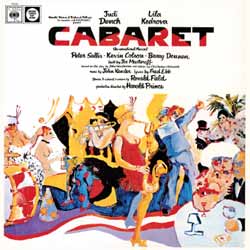|
Click here to return to the main site. Music Review
1930s Berlin is a city of stark contrasts. With the country on the verge of financial ruin, extreme political parties fight in the streets for power, while the poor struggle on. In the magical confines of the Kit Kat Klub cross dressing and hedonism are the order of the day as the morally dissolute party till the end of the world overseen by the Master of Ceremonies (the Emcee). Coming into this heady mix, Clifford Bradshaw, a young American novelist, arrives to research his second book, taking lodgings in Fraulein Schneider boarding house. Soon he is drawn to the Kit Kat to meet Sally Bowles, an English woman who performs in the club. Against the background of the rise of the Nazis Clifford and Sally begin a doomed relationship... Cabaret (London) is the original cast recording of the cast from the original run. The show was famous for many reasons, not least its genuine popularity with audiences. Its star Judi Dench (Sally Bowles) had primarily been a Shakespearian actress, but her performance in Cabaret shot her to fame, winning her real critical praise for her performance. Does she sing better than Liza Minnelli in the film version, or does she turn out to be a more accomplished dancer? The answer to these two questions is no, but the original remit for Sally was that she was a bit naff. What Dench lacked in technical expertise she more than made up with passion and an ability to imbue her songs with real emotion. The show features the talents of Lila Kedrova (Fräulein Schneider), Peter Sallis (Herr Schultz), Kevin Colson (Clifford Bradshaw) and Barry Dennen (Master of Ceremonies). The Book was by Joe Masteroff, music by John Kander with lyrics by Fred Ebb. For most people the central theme of the show would come from the song 'Cabaret', which extols people to stop sitting alone in their rooms when they could come out and join the party, but for me the central song of the show has to be 'Tomorrow Belongs to Me', the disturbingly rousing song sung by the Nazis. The first one, although it asks the audience to make a choice, the choice is only to party regardless of what is happening around them, while the latter demands that you make a choice about your future. The relationship between Clifford and Sally is ultimately doomed as she would rather party, hiding her head in the sand as to the threat the Nazis pose, whereas Clifford, realising what the future will hold leaves Berlin, supposedly to forge a future not in the Nazis vision. Fans of the film have to be aware that many songs and some very good songs were written specifically for the Bob Fosse film and do not appear in the stage play, so there is no 'Maybe this Time' or 'Mein Herr' or even 'Money', although the show does have the comparable 'The Money Song', which performs the same function. The full listing of the recording is: 'Wilkommen' (5:01) Barry Dennen and Company Once again, I stand astounded that such elderly recording still have the clarity of a modern recording. For most shows it’s a shame that the libretto isn’t also included to give the song some narrative structure, but in the case of Cabaret the story is so well known that it’s not really a problem. It’s a great chance to collect two definitive performances, one from Dench as the ultimate Sally and Barry Dennen's manic performance as the Master of Ceremonies, so much that every performance of the part which followed sounds like a homage to Dennen’s. For the quality of the performances and recording, this is a disc that is worth adding to your collection. 9 Charles Packer |
|---|


